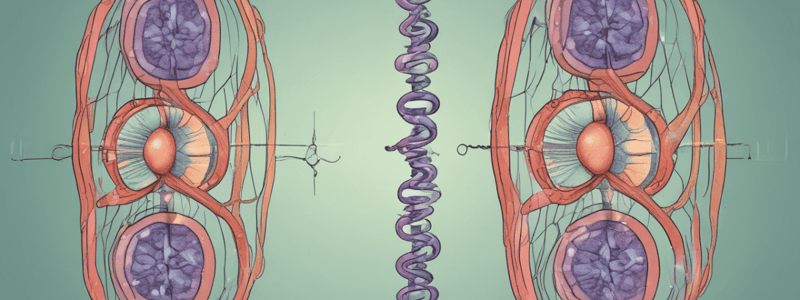Podcast
Questions and Answers
What is the ploidy of the chromosomes in a cell at the beginning of mitosis?
What is the ploidy of the chromosomes in a cell at the beginning of mitosis?
- Diploid (correct)
- Tetraploid
- Haploid
- Triploid
How many chromosomes do humans have in a diploid cell?
How many chromosomes do humans have in a diploid cell?
- 46 (correct)
- 92
- 100
- 23
What is the result of mitosis in terms of the number of cells and their genetic information?
What is the result of mitosis in terms of the number of cells and their genetic information?
- Four cells with different genetic information
- Two cells with the same genetic information (correct)
- Two cells with half the genetic information
- One cell with half the genetic information
What can each of the resulting cells do after mitosis?
What can each of the resulting cells do after mitosis?
How many phases does meiosis have?
How many phases does meiosis have?
What is the ploidy of the chromosomes in each of the two cells resulting from Meiosis One?
What is the ploidy of the chromosomes in each of the two cells resulting from Meiosis One?
What happens to the cell's DNA during interphase in meiosis?
What happens to the cell's DNA during interphase in meiosis?
What is the main purpose of mitosis in the human body?
What is the main purpose of mitosis in the human body?
What is the primary purpose of meiosis?
What is the primary purpose of meiosis?
During meiosis, how many cells are produced that have the haploid number of chromosomes?
During meiosis, how many cells are produced that have the haploid number of chromosomes?
What is the term for the phase of meiosis where homologous pairs are split?
What is the term for the phase of meiosis where homologous pairs are split?
What is the main difference between meiosis and mitosis?
What is the main difference between meiosis and mitosis?
Where does meiosis occur in the human body?
Where does meiosis occur in the human body?
What is the result of meiosis in humans?
What is the result of meiosis in humans?
What is the significance of meiosis in the context of the 'circle of life'?
What is the significance of meiosis in the context of the 'circle of life'?
What is the difference between germ cells and somatic cells?
What is the difference between germ cells and somatic cells?
Flashcards are hidden until you start studying
Study Notes
Mitosis vs Meiosis
- In mitosis, a cell with a diploid number of chromosomes (2n) undergoes cell division to produce two daughter cells, each with the same diploid number of chromosomes (2n).
- Each daughter cell has the same genetic information as the original cell and can undergo interphase, replicating its DNA and growing, before dividing again through mitosis.
- This process occurs in somatic cells, making up the bulk of the body, and allows for growth and development.
- In meiosis, a cell with a diploid number of chromosomes (2n) undergoes cell division in two phases to produce four daughter cells, each with a haploid number of chromosomes (n).
- In meiosis, the homologous pairs of chromosomes are split, resulting in genetic variation in the daughter cells.
Meiosis
- Meiosis occurs in germ cells, such as those in the testes or ovaries.
- The process of meiosis involves two phases: Meiosis One and Meiosis Two.
- In Meiosis One, the diploid number of chromosomes is reduced to a haploid number, resulting in two cells with a haploid number of chromosomes.
- In Meiosis Two, each of the two cells from Meiosis One undergoes a second round of cell division, resulting in four daughter cells, each with a haploid number of chromosomes.
- Meiosis is not a cycle, and the resulting daughter cells are gametes (sperm or egg cells) that can be used in fertilization.
Key Differences
- Mitosis produces two identical daughter cells, while meiosis produces four genetically varied daughter cells.
- Mitosis occurs in somatic cells, while meiosis occurs in germ cells.
- Mitosis allows for growth and development, while meiosis allows for genetic variation and the production of gametes.
Studying That Suits You
Use AI to generate personalized quizzes and flashcards to suit your learning preferences.




